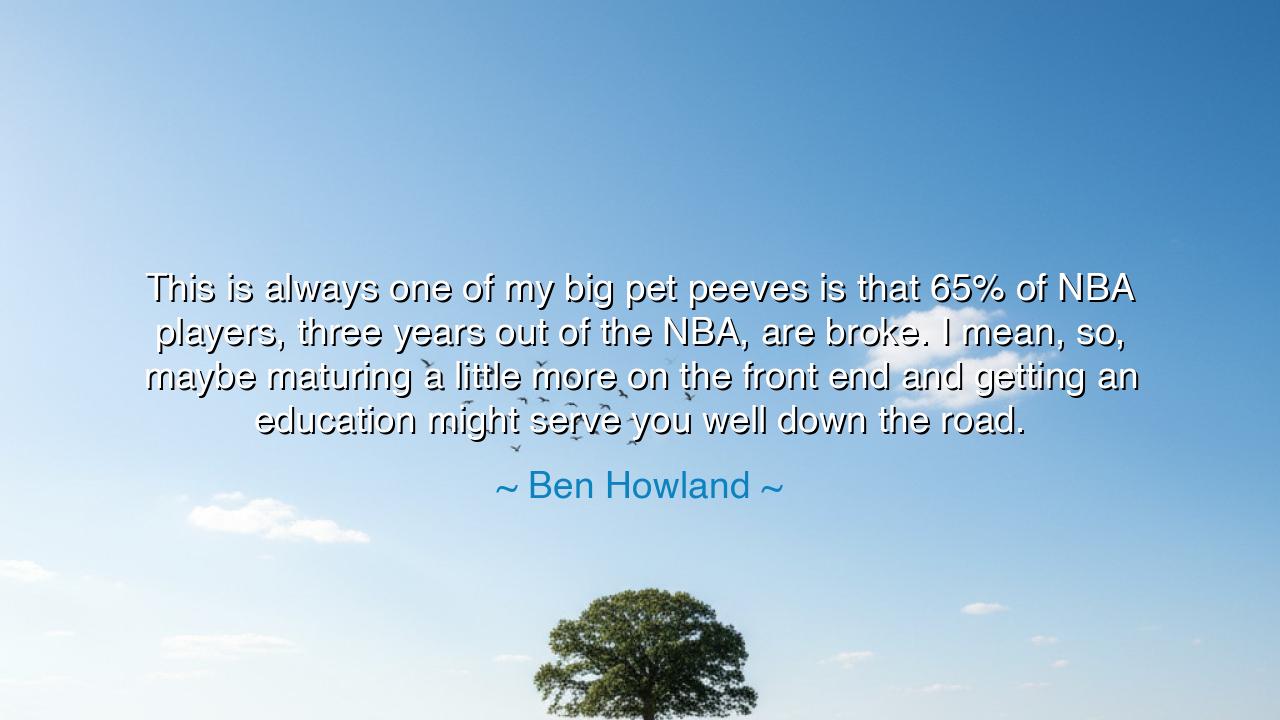
This is always one of my big pet peeves is that 65% of NBA
This is always one of my big pet peeves is that 65% of NBA players, three years out of the NBA, are broke. I mean, so, maybe maturing a little more on the front end and getting an education might serve you well down the road.






When Ben Howland declared, “This is always one of my big pet peeves is that 65% of NBA players, three years out of the NBA, are broke. I mean, so, maybe maturing a little more on the front end and getting an education might serve you well down the road,” he was not merely lamenting wasted wealth. He was speaking to the eternal struggle between youth and wisdom, between fleeting glory and enduring foundation. His words burn with urgency, reminding us that riches without discipline vanish, and talent without foresight leads only to ruin.
The meaning is clear. To rise into the ranks of the NBA is to ascend to a world of sudden fortune and praise. But many, unprepared for such abundance, spend recklessly, trust unwisely, and fail to see that a career built on physical power is brief. Within a few short years, the cheers fade, the contracts end, and the body no longer answers as it once did. Then, without maturity, without planning, without the guidance of education, many find themselves in poverty, despite once holding millions in their hands. Howland’s anger is not scorn but sorrow, for he sees wasted potential—men who might have built empires instead left with nothing.
History offers many parallels to this tragedy. Consider the tale of the Roman gladiators. Though adored by the crowds and richly rewarded in their prime, many died penniless, for they knew nothing beyond the arena. Only those who planned wisely, who sought trade, property, or patronage, survived with dignity when their strength waned. Likewise, in modern times, countless athletes, musicians, and actors have seen wealth pour in like a flood, only to watch it vanish when the season of their fame was over. Without the anchor of foresight, riches are like sand slipping through the fingers.
The origin of Howland’s warning is rooted in his role as a teacher and coach. He devoted his career to shaping young men, not only as athletes but as human beings. He knew that talent may open doors, but only character and wisdom keep them open. Thus, when he calls for maturing “on the front end,” he speaks as one who has watched the cycle repeat again and again: the gifted youth, the meteoric rise, the careless fall. His plea is that players prepare before fortune comes, so they will not be devoured by it.
There is also a heroic challenge in his words. For what good is victory on the court if defeat follows in life? To win championships but lose one’s livelihood is no triumph at all. True greatness lies not only in performance but in stewardship—knowing how to guard what has been given, and how to build upon it. Education, discipline, and humility may seem slow and unglamorous, but they are the stones upon which lasting legacies are built.
The lesson is this: talent will fade, but wisdom endures. Riches may come suddenly, but without planning, they vanish just as quickly. Therefore, invest not only in the moment of glory, but in the future that awaits when the lights dim. Whether you are an athlete, an artist, or a worker in any field, prepare yourself with knowledge, cultivate prudence, and think always of the days ahead.
In practical action, this means: if fortune comes to you, do not spend without thought. Seek counsel, save wisely, and continue to learn, for education is wealth no thief can steal and no weakness can erode. Parents, mentors, and teachers—guide the young not only in skill but in foresight. And for each of us, whether rich or poor, the principle remains: live not only for today’s applause, but for tomorrow’s survival.
Thus Ben Howland’s words resound like a coach’s call across the centuries: “Maybe maturing a little more on the front end and getting an education might serve you well down the road.” It is both a rebuke and a gift of wisdom. He warns us not to be dazzled by present glory, but to build for the future. For the one who combines skill with foresight, and talent with wisdom, will not only shine for a season, but endure with dignity long after the game is done.






AAdministratorAdministrator
Welcome, honored guests. Please leave a comment, we will respond soon